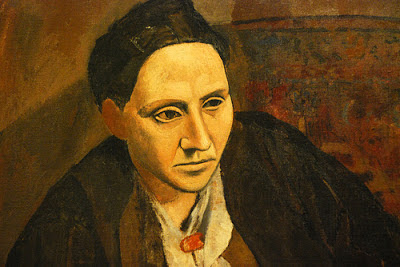.
Gertrude Stein is very important to me, and I could not tell you why. All I know is that I find myself thinking about her a lot more than I do about, say, F. Scott Fitzgerald or William Faulkner, authors whose works you might think would be a lot more utile to me as a writer.
At her best, she wrote works of genius -- though what kind of genius it's sometimes hard to say. And much of her writing was so gnostic that critic Michael Dirda, genial man though he is, was prompted to compare it to children playing in a sandbox: They're obviously involved in something intense, "but what it is, only the angels in heaven know."
Still, whenever I encounter an article about her, I immediately pick it up and read it. Which is how I noticed that inevitably the writer will refer to her as looking "mannish."
Odd word choice, that, because she looked like a lot of women of a certain heft and age. You could easily have an aunt who looks like her. There was really nothing strange or man-like about her appearance. Now, obviously, the writers are (a) being lazy and (b) signaling the reader that she was a lesbian. But there are so many different ways of conveying that information ("She was a lesbian" leaps to mind, or "Alice B. Toklas was her lover") that it seems there must be something behind that word.
My theory is this: Everybody agrees that Stein took herself very seriously indeed. She knew she was a genius and would tell you so to your face. She deferred to nobody. And she clearly thought she was the most important writer alive.
The great male egos of the time were all exactly the same way. Consider only Hemingway and Picasso. But women creators did not act that way. They may have thought it -- I'm guessing Virginia Woolf had a pretty good notion her work would endure -- but they didn't shove that fact in your face, the way the guys did.
Except for Gertrude. She did it and she got away with it and it's too late now to put her in her place. So when she's written about, that word "mannish" is brought out like a ritual slap in the face: You weren't properly deferential, it says. You stepped out of line.
That's only a theory, mind you. But reading some of what's written about her, the subtext is strong.
*




5 comments:
I agree with most of what you say about Stein's appearance not being more "mannish" than many, but I'm not sure you're giving proper credit to her cropped 'do. That by itself could be enough to evoke the adjective from most contemporary observers.
I in turn agree with almost all you say. We'll give a pass to her contemporaries, and on up through the early Sixties (when short hair became an option for straight women which sexist men absolutely loathed). But they're still doing it! That sort of persistence suggests a pathology.
Looking at the above, I have to add: But I could be wrong.
I remember reading a part of her short monograph 'Saving the Sentence' I thought she was playing with language and surrealism to change our attitudes toward writing from the traditions of the early twentieth century into something more flexible. I can't say I've read anything else by her, but from that one book, I gained a lot of respect for her approach.
Perhaps you would appreciate a song about Gertrude Stein? If so, here ya go...http://www.youtube.com/watch?v=UiV1DtfKXAA
They are Scottish, the song came out in '99
Nicely put.
I've just finished reading the autobiography of Tina Fey (noted for her Sarah Palin impersonations) and she has some interesting things to say about how some people interpreted her impersonations as cruel and unfair and showed great sympathy for Palin for being subjected to them.
She asks whether either of those things would have happened had a male comedian been mocking a male politician, which is well worth considering.
Post a Comment